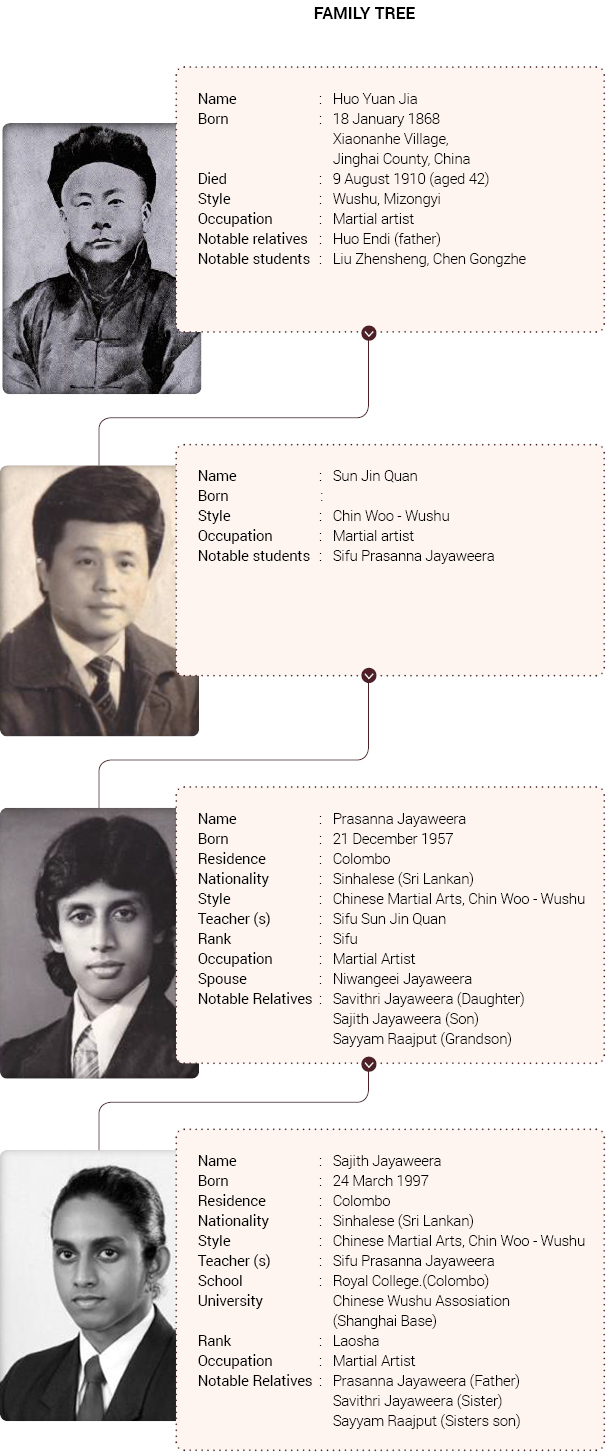On an invitation extended by Sifu Prasanna Jayaweeera in 1989., through a mutual friend who was Dr Chang Long Wang (Managing Director, Chinese Medical Centre of Sri Lanka) the Chief Instructor of the Shanghai Chin Woo Wushu Association Sifu Sun Jin Qun visited Sri Lanka to promote the art of Chin Woo Wushu. Sifu Sun Jin Qun spent close to 2 years in Sri Lanka promoting this art together with Sifu Prasanna Jayaweera. As a result of this close relationship between Sifu Sun Jin Qun and Sifu Prasanna Jayaweera, the Sri Lanka Chin Woo Wushu Association was established.
Since inception to-date there have been well over a thousand students who have graduated learning the form of Chin Woo Wushu. In addition, the Sri Lanka Chin Woo Wushu association has been fortunate to have been able to send athletes to the Shanghai Chin Woo Athletic association for higher studies in the form of Chin Woo Wushu physical education. These students who were sent to Shanghai has graduated with honours from the parent association in Shanghai. It has been the generous assistance offered by Sifu Sun Jin Qun which has assisted the Sri Lankan students to obtain the necessary merit.
The Sri Lanka Chin Woo Wushu Association in Sri Lanka is a permanent member of the Shanghai Chin Woo Athletic Association and a Member of the International Chin Woo Athletic Federation.
The Sri Lanka Chin Woo Wushu Association thanks the Chairman and the Executive Committee of the Shanghai Chin Woo Athletic Association for their commitment and dedication to promote Chin Woo and strengthen the Chin Woo Wushu Association in Sri Lanka.
May Chin Woo Shine Forever!
Grandmaster Huo Yuanjia was born in Xiaonanhe Village in Jinghai County, Tianjin, as the fourth of Huo Endi's ten children. The family's main source of income was from agriculture, but Huo Endi also made a living by escorting merchant caravans to Manchuria and back. Although he was from a family of traditional wushu practitioners, Huo was born weak and susceptible to illness. He had asthma and, at an early age, he contracted jaundice, which would recur periodically for the rest of his life. It is theorised that he may have had a mild form of congenital jaundice known as Gilbert's syndrome.Due to his frail frame, his father discouraged him from learning wushu.
Huo Endi hired Chen Seng-ho, a tutor from Japan, to teach his son academics and moral values. In return, Chen was taught the Huo family's style of martial arts, mizongyi. Huo still desired to learn wushu, against his father's wishes, so he observed his father teaching his students martial arts in the day and secretly practised at night with Chen.
In 1890, a martial artist from Henan visited the Huo family and fought with Huo's elder brother, who lost. To the surprise of his family, Huo fought with his brother's opponent and defeated the latter. As Huo proved that he was physically able to practise wushu, his father accepted him as a student. As he became older, Huo went on to challenge martial artists from neighbouring areas and his fame grew as he defeated more opponents in bouts.
Huo joined his father at work as a caravan guard. One day, while escorting a group of monks, Huo was confronted by a group of bandits, who threatened to attack the monks. Huo fought the bandit chief and defeated him. News of his feat spread and added on to his growing fame. In 1896, Huo went to Tianjin and made a living there by working as a porter in the Huaiqing pharmacy and by selling firewood.
In 1902, Huo responded to a challenge advertised by a Russian wrestler in Xiyuan Park,Tianjin. The wrestler openly called the Chinese "weak men of the East" because no one accepted his challenge to a fight. The Russian forfeited when Huo accepted his challenge and told Huo that he was merely putting on a performance to make a living and apologised for his earlier remark in the newspaper.
Between 1909 and 1910, Huo travelled to Shanghai twice to accept an open challenge posed by an Irish boxer, Hercules O'Brien. The two of them had arguments over the rules governing such boxing matches and eventually agreed that whoever knocked down his opponent would be the victor. O'Brien fought Huo and lost. Huo's victory was a great inspiration to the Chinese people and had them questioning the basis of imperialistic dominance. However, there is a lot of controversy over whether the fight ever took place. A recent article states that O'Brien opted to leave town instead.
Between 1909 and 1910, Huo founded the Chin Woo Physical Training Centre (later renamed to "Chin Woo Athletic Association") with his close friend Nong Jinsun, who served as the president of the association. Huo was encouraged by his close friends and was sponsored by Sun Yat-sen and Song Jiaoren, who were living in Tokyo. The centre was meant to be a school for learning the arts of self-defence and improvement of health and mind.
Huo suffered from jaundice and tuberculosis and started seeing a Japanese physician for medication and treatment. The physician, who was a member of the Japanese Judo Association in Shanghai, invited Huo to a competition upon hearing of the latter's fame. Huo's student, Liu Zhensheng, competed with a judo practitioner. Although there were disputes over who won the match, both sides generally agreed that the disagreement culminated in a brawl and that members of the judo team were injured, some with broken fingers and hands, including the head instructor.

Main Gymnasium
3/7 A, Jayanthi Mawtha, Jayanthipura,
Sri Jayawardanapura, Battaramulla, Sri Lanka.
City Office & showroom
19/1, Office complex, Borella,
Colombo 08, Sri Lanka.
Tele/Fax : +94 (0)11 2888595
Mobile : +94 (0)77 0888595
Email : slchinwoo.wushu@gmail.com